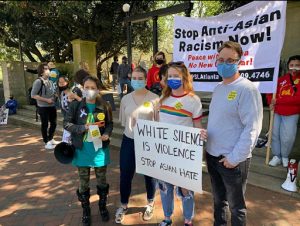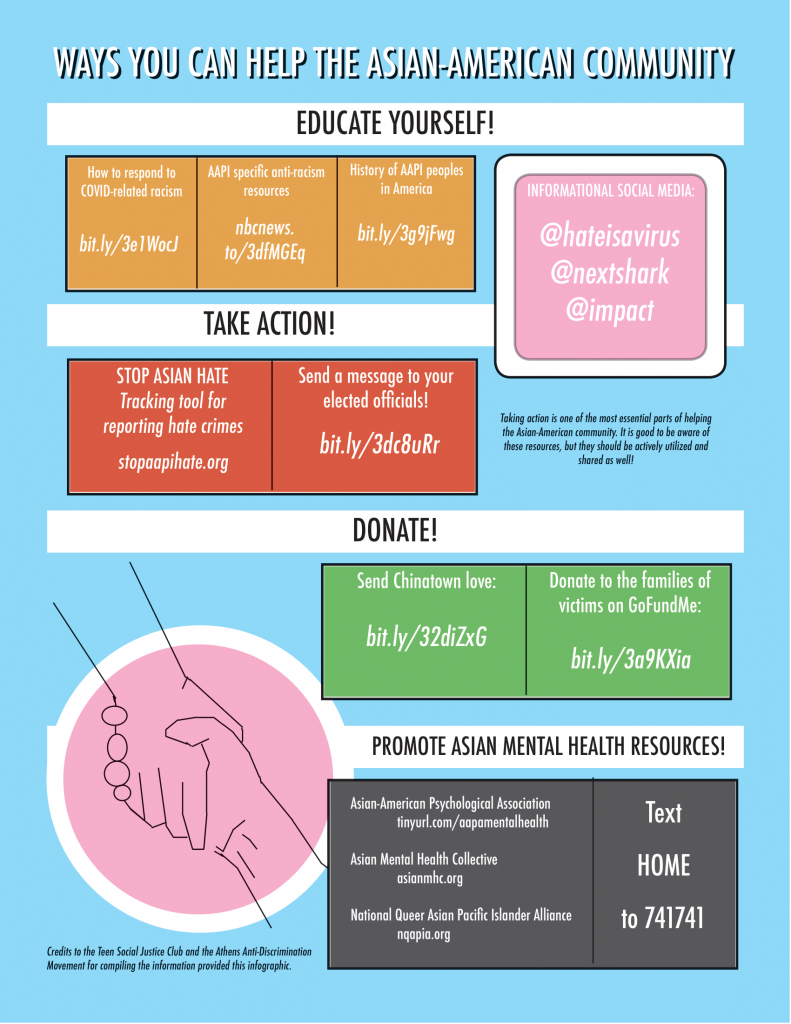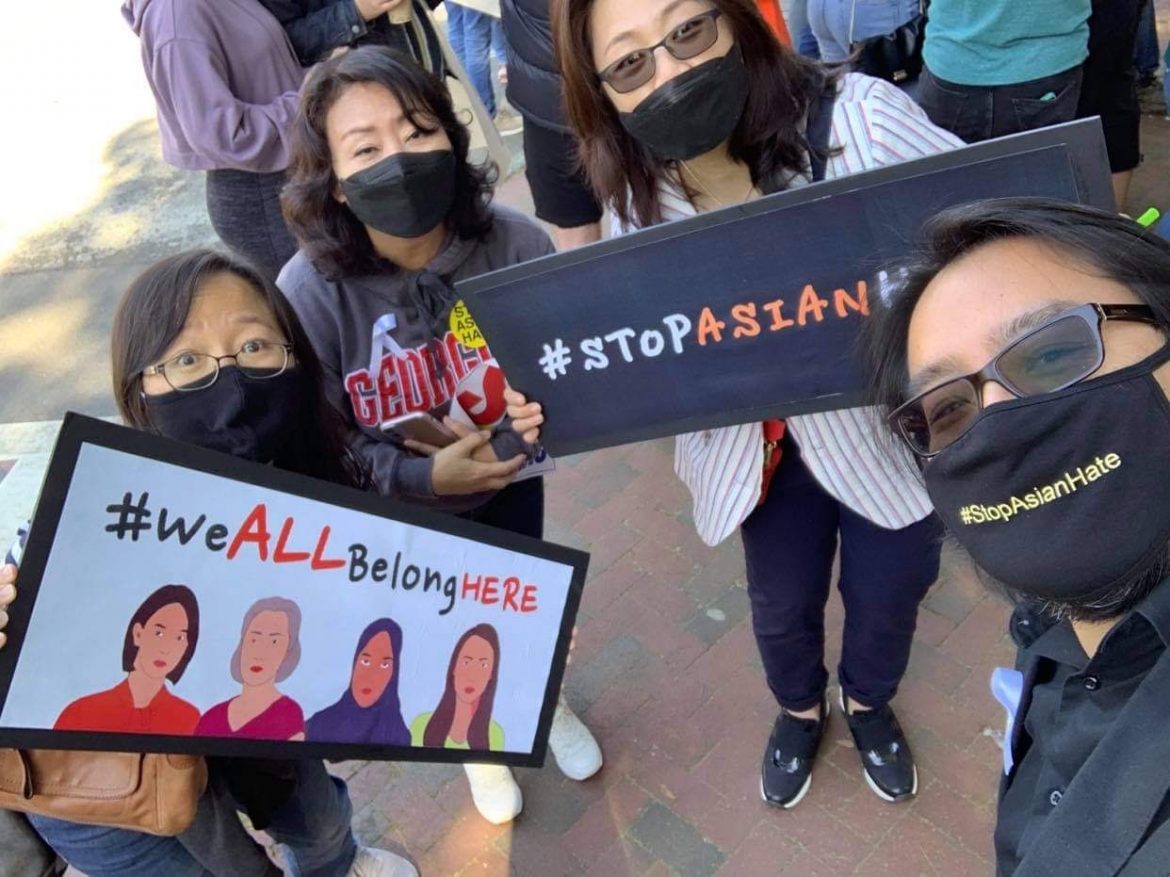Secretary General of the Atlanta Korean American Committee Against Asian Hate Crime Michelle Kang (second from left) and Asian-American Atlanta small business owner Long Tran (far right) stand on Hancock Avenue in Athens protesting against hate crimes targeting Asian-Americans on April 3. Kang and Tran marched from the UGA Arch to City Hall to spread awareness about the spa shootings in Atlanta that happened on March 16. “I want (people) to know (that Asians) are being racially discriminated (against and) really suffering from racial issues. (People) say, ‘No, Asians (have) not (been) a victim of racism,’” Kang said. “At this point, (other activists and I) want to utilize this momentum after the Atlanta shooting. We want to talk more (about) what we experienced as Asian-Americans and (how) we are worrying about our next generation (of) Asian children.” Photo courtesy of Long Tran
On March 16, a series of mass shootings occurred at three spas in Atlanta, leaving eight people dead. Six of those victims were Asian-American, leading people to believe there may have been a racial motivation to the shootings, according to the New York Times.
“Whatever the motivation was for this guy, we know that the majority of the victims were Asian,” Mayor Keisha Lance Bottoms of Atlanta said in the NYT article. “We also know that (racism against Asian-American) is an issue that is happening across the country. It is unacceptable, it is hateful and it has to stop.”

Protestors stand in front of the University of Georgia Arch on April 3 during the Unite Against Asian Hate rally organized by the Athens Anti-Discrimination Movement. The rally was organized in response to a series of shootings that took place in Atlanta on March 16. “One of the most difficult things is when violence happens towards Asian-Americans, (it) goes underreported because the victims feel so ashamed. They don’t want to tell anyone, they don’t want to tell the police,” Long Tran, owner of Peachy Corners Cafe in Atlanta, said. “Since the (Atlanta spa) shooting, we’ve had over 400 acts of violence towards Asian-Americans across the country, but (I and others) question how much more than the 400 there are because victims often are shamed into just being quiet about it.” Photo courtesy of Long Tran
“We did a march from the Arch at (the University of Georgia) to City Hall. (During) that march we walked through some busy areas where people were outside, eating, dining, just hanging out talking, so I (know) they saw the signs, (and) they were very curious,” Long Tran, owner of Peachy Corners Cafe in Atlanta, said. “Some people came up and asked what this was about, (and) it was surprising to see that some people living in Athens didn’t hear about the spa shootings in Atlanta.”
“One thing we really did was try to make it a safe and comfortable environment for our girls because sometimes it’s kind of hard to feel comfortable and feel like you’re at home with those that don’t have the same culture or values as you.”
— Katrina Lengsavath,
UGA SOUL co-founder
In addition to the rally put on by AADM, other organizations have shown support against Asian discrimination. One such group is the UGA SOUL group, which was co-founded by UGA alumna Katrina Lengsavath.
“We’ve been spreading awareness (about the March 16 shootings) by creating our own newsletter (with) more information on what happened (in Atlanta). We post (the newsletter) on our social media, and we just want to spread awareness (and) to be like, ‘Hey, this is not acceptable,’” Lengsavath said. “We (want to) spread awareness to not only our girls (in SOUL), but to other organizations who may follow us, whether it be other multicultural organizations or just regular Greek Life or your everyday people.
SOUL was founded in 2019 by a group of girls at UGA who wanted to have more Asian inclusion in the multicultural Greek life at UGA. They work to encourage and empower Asian-American women.

An infographic provides a variety of resources people can use to support the Asian-American community. The information featured was compiled by the Teen Social Justice Club and was distributed by the Athens Anti-Discrimination Movement. Infographic by Daniel García-Pozo
“There are two other Asian sororities already established on campus, (but) I feel like with Panhellenic Greek Life, you may not fit into a certain group. Although (we’re aiming) for the same goal, Asian inclusivity, we wanted to create our own sorority so that those who didn’t necessarily fit in with their organization would feel more involved and still feel very included (in) their Asian communities,” Lengsavath said. “One thing we really did was try to make it a safe and comfortable environment for our girls because sometimes it’s kind of hard to feel comfortable and feel like you’re at home with those that don’t have the same culture or values as you.”
At the UAAH rally, multiple community members spoke about their experiences and shared words of hope. Secretary General of the Atlanta Korean American Committee Against Asian Hate Crime Michelle Kang, was both a speaker and attendee, believes that this rally helped bring Asian discrimination awareness to the Athens community.
“(My) talk at the rally (emphasized) that the (world) we live in is not safe anymore for Asian-Americans, especially for (the) elderly and women. There (are) physical attacks and verbal harassment (against us), and we don’t feel safe anymore walking on the street and using the transportation,” Kang said. “We’ve (all) been a victim of racism (in the past). At this point, (AKAC) wants to utilize this momentum after the Atlanta shooting. We want to (have) more conversations (about) what we experienced as Asian-Americans and (how) we are very worried about our next generation (of) Asian children.”
Tran was also a speaker and attendee at the rally and believes that there is hope for better treatment of Asian and Asian-American people in the United States.
“(Events like this) will provide the confidence to different people in (their) communities to rise up and speak out against (discrimination and) speak about their own experiences.”
— Long Tran,
Peachy Corners Cafe owner
“(In the) long term, (events like this) will provide the confidence to different people in (their) communities to rise up and speak out against (discrimination and) speak about their own experiences,” Tran said. “For the non-Asian members of the community (and) other minority groups, they’ll be more receptive and continue cross-community dialogue so that we fight through this together for all our communities.”
Overall, Kang was appreciative of the UAAH rally and hopes that people will continue to support and empower Asian-Americans.
“My three daughters were born (in America, and people) still ask my daughters if they weren’t born here and (say), ‘Your English is good.’ My daughters (would be) embarrassed and humiliated,” Kang said. “We need to stop (this stereotyping and erasure) because Asian-American history is integrated in American history. History in school is only teaching about the White people’s history and what they have done in American history. Asians need to be visible and be a part of American history.”
Story by Elena Webber, Daniel Garcia-Pozo and Maya Cornish
Package by Gretchen Hinger and Ireland McCage
